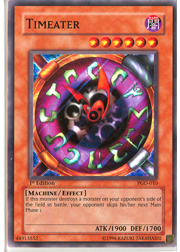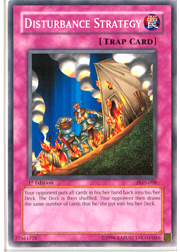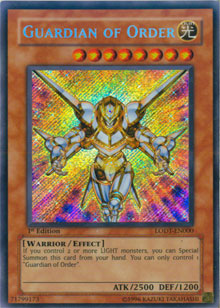 In May 2007, I introduced a "new" concept foreign to the dueling world: time management. It’s been quite a while since then and I’ve spoken very little about it, so I thought I would bring it up again. Time management isn’t some self-improvement gimmick I’m peddling to fill up a draft. It’s a concept that all duelists should understand and use.
In May 2007, I introduced a "new" concept foreign to the dueling world: time management. It’s been quite a while since then and I’ve spoken very little about it, so I thought I would bring it up again. Time management isn’t some self-improvement gimmick I’m peddling to fill up a draft. It’s a concept that all duelists should understand and use.
The principles of time management are predicated on the simple fact that your time exists in a limited quantity. You have 168 hours in a week. The fact that you sleep (assuming 7-8 hours a day) reduces that number to 112–118 hours. Then, depending on your age, you have school or work to attend to. If you’re particularly ambitious, you have both. Now you’re down to less than 70 hours a week. What do you do?
This is precisely why time management techniques exist: to show you how to make the best use of your precious time. I stand by everything I said in my introductory article on time management. Nothing will change from there. With this article I’d like to expand on some points and include more advice that you will hopefully find useful.
Prioritization as the Foundation
My first article tackled time management from a systematic approach. I advocated the use of different systems and measurements ("yard sticks") in order to understand your own "time consumption." I also supported the use of different techniques to improve your efficiency with time. A few months later I elaborated on time efficiency in my article on Pareto’s Principle or the "80-20 Rule." While these tools are extremely helpful, they’re useless without one critical factor: motivation. Your inner motivations dictate everything you do. If you’re not motivated to do something then you’ll find it very difficult to exert any kind of effort. Your motivations flow from your priorities. Your priorities are the standard by which you decide what is worth your time and what is not.
How do you decide what your priorities are? It all depends on what you value. What’s important to you? This is not an easy question to answer because it’s very personal. Think about that for a moment or two. I won’t tell you what your priorities should be—that part is up to you—but I can tell you how your priorities affect your personal time. I’ll use a simple example.
Let’s say your hierarchy of values consists of the following in order of importance:
1) Work.
2) School.
3) The Yu-Gi-Oh! TCG.
Work is very important in this hierarchy of values. More of your time will go into work by default. The minimum is probably 40 hours per week (sometimes more), so that puts a strain on your time as it is. School is second in your value hierarchy so you’ll want to devote a decent amount of time to it, but not as much as work. Let’s say 10–20 hours a week: almost half as much as a full-time job. Your third highest value is the game you play. After allocating
"x" amount of hours to work and school, whatever’s left over is for the Yu-Gi-Oh! TCG. It’s probably not much and we’re not even counting commute time or time spent on random things. It’s easy to see how this works: the higher something is on your priority list, the more time it will (and should) get.
The Importance of a Strategy
By now you are probably acutely aware that your time is scarce and very valuable to you. You have many things in your life that are important to you and you want time for all of them, right? Not everything will get an equal amount of your attention. You have to make these tough choices on your own, and this is where strategy comes in. Every action will flow from your priorities. The purpose of making your use of  time more efficient is to "create" more time for everything else you have on your list of priorities. Try thinking of time as a sort of currency. The time you create goes into an imaginary bank account. We’ll call it the "Time Savings Fund." The more time you created for your fund, the more you’ll have for future use. Simple, right?
time more efficient is to "create" more time for everything else you have on your list of priorities. Try thinking of time as a sort of currency. The time you create goes into an imaginary bank account. We’ll call it the "Time Savings Fund." The more time you created for your fund, the more you’ll have for future use. Simple, right?
Let’s use this methodology in the following practical example. Your testing sessions have been running at four hours or so with lackluster results. Because of that, you’ve felt that you never get enough practice in, and the only solution seems to be to spend more time testing. There’s a big problem with that: you don’t have any more time to devote to testing. You barely have enough time to think because you’re working overtime at your job. Or the four hours you get is already pushing your limits because you’ve got college homework. The last thing you need is the creeping feeling of guilt that you’re neglecting your studies. Your slipping grades seem to validate this guilt.
Clearly you’ve got a dilemma. You have two choices: 1) spend more time testing, or 2) spend less time testing. Both of these are horrible choices, so what’s your solution? Start developing systems that not only simplify testing, but improve the quality of your results. I’ve written at length about the tools available to you and different systems to use. What will improved results do? They will "create" more time for you. Let’s say you use a new analysis technique and it takes you one less hour to refine a deck. That extra hour can be spent doing something else important to you like homework or hanging out with friends. Do you see how this works?
Staying Organized
One major point I will stress is the importance of staying organized. This is where a task list and a calendar come in handy. Start keeping track of how you spend your time. Make appointments with yourself in order to get things done. A calendar is a great way to keep track of your "appointments." Google Calendar and Outlook are great tools for this. Keeping a daily task list is something I use personally. Whenever something comes up that you need to remember, it helps to have a notebook handy to jot it down. An ordinary spiral notepad works fine for this. If you’re more of a technology-oriented person there are plenty of task-keeping applications out there. Google Notebook is my favorite and your cell phone works well here too.
When you start keeping a calendar and a task list you’ll find that things seem to pop-up out of nowhere. You have to decide whether that particular thing is a priority or not. How you prioritize is up to you, but I’ll offer you a good template. Borrowing from Stephen Covey’s work on highly effective people, there are four categories: Important and Urgent, Important and Not Urgent, Not Important but Urgent, and Not Important and Not Urgent. Something classified as Important and Urgent needs to be done immediately or huge ramifications will ensue. If something is Important but Not Urgent it needs to be done no matter what, but you can get to it later. (Be careful with these because they can pile up to the point where they are  unmanageable.) If something is Not Important but Urgent, then you’re best served letting it be until a number of similar tasks pile up. Then you can tackle them all at once later. These are the kind of things that are very annoying and consume your time unnecessarily. Get rid of these in any way you can and try to minimize their appearance in your daily life.
unmanageable.) If something is Not Important but Urgent, then you’re best served letting it be until a number of similar tasks pile up. Then you can tackle them all at once later. These are the kind of things that are very annoying and consume your time unnecessarily. Get rid of these in any way you can and try to minimize their appearance in your daily life.
If something is Not Important and Not Urgent, then let someone else worry about it. A quick example: you’re working on a very important school paper and your friend sends you an instant message telling you to read the latest forum posting from some newbie who doesn’t know what he or she’s talking about. You have a choice here. While that post may be good for a laugh, you’ve got a paper to write. What do you do? You could answer the message and check out the post. You figure "I can always get back to my paper. I’ve got to see this." Is this wise? Probably not. One small interruption can easily turn into three, four, five, or six different things you must attend to. This is failure to understand the nature of unimportant things: they never stop coming. Whether you choose to acknowledge this is your choice, but ignore it at your own peril.
Observe how this affects you in our previous scenario: you’ve probably lost track of time cruising the hilarious forum posts. Now you think, "OK, let’s work on this paper." Guess what? It’s already late at night. You’ve got school the next morning. You can’t pull an all-nighter because a nasty thing called fatigue will make sure you regret it. Your paper isn’t done and the next day, more stuff piles up on your plate. You have more time-consuming assignments to do, but you haven’t even finished the previous ones. The more homework you do, the more stuff seems to pile up—daily. Now you have to spend your weekend playing catch-up rather than enjoying yourself. Don’t let this happen to you.
Final Thoughts
A duelist’s time is very precious and he or she should act accordingly. Being in control of things in your life will give you a sense of genuine satisfaction. You’ll be happier, more organized, and able to take on new challenges with full awareness of their potential effects on you. While learning the nuts and bolts of time management you might stumble along the way: I have many times, but you’ll find the end result worth it. It’s a great feeling to know exactly what’s going on, what you have to do, and how you can control your approach to it all. I hope that you’ve learned a great deal from this article and I’m confident that these ideas will pay dividends to you, regardless of your approach to Yu-Gi-Oh!
Until next time, stay focused and have fun!
—Bryan Camareno